With 195 countries in the world, becoming an expat is an enchanting idea. However, moving abroad is an enormous decision that comes with a laundry list of to-dos and what-ifs — How do I obtain a visa? Where will I work? What if I can’t find a place to live? How will I make friends?
Though it comes with a lot of preparation, moving abroad can be a fulfilling life experience with opportunities to learn about new places and cultures. Living in another country can push you outside of your comfort zone and force you to appreciate life in the moment.
We reached out to experienced expats, so they could answer some of those initial questions and their advice with you. Check out their guide to becoming an expat below!
What is the most important step to take when you finally decide to move abroad?
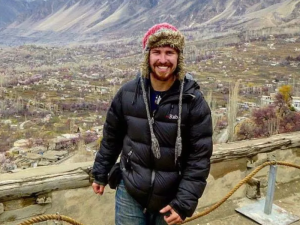 Will Hatton, The Broke Backpacker
Will Hatton, The Broke Backpacker
“Confidence in your decision. Before you move, a lot of friends and even family may cast doubt on your decision – you’re stepping out of your comfort zone and a lot of people find it threatening to imagine any kind of life outside of the normal 9-5. Be confident in yourself and your decision – you’re on the road to forging a new lifestyle for yourself and it is going to rock!”
How should you go about completing a visa application and/or obtaining a visa?
 Megan Jerrard, Mapping Megan
Megan Jerrard, Mapping Megan
“Making sure you’ve applied for the right visa is the biggest thing! You’ll probably find that there are many different visas when you go to apply, though if you plan to work, or you’re heading over to study, it’s really important to apply for the right visa. For instance, restrictions on a tourist visa won’t allow you to work, and in many countries may only permit you to stay for 30 days. It’s a big deal if you breach the terms of your visa, so make sure you’re getting the right one.
Visa applications are often drier than doing your taxes, but print all the forms and information, pull out your highlighters and read through everything a couple of times. I find that physically printing something out and being able to highlight it means I understand the process better than if I was reading it online. I then make my own checklist of everything I need to do and include. Visa applications can take a lot of time to process, and they often cost a lot. If you’re denied because you forgot to include something, you won’t get a refund of your money or your time. So be meticulous in checking, double checking and triple checking your applications.
The best place to find visa information is usually on your government website, and the government website of your chosen country. There may also be a website set up for your embassy in the country you hope to move to.”
What’s the best way to find a place to live?
Selena Taylor, Find us Lost 
“It’s so much easier to find a place to live when you’re already abroad. Before our move, we made sure to get a sense of Amsterdam’s neighborhoods and pricing. When we arrived, we had already rented an Airbnb for a month, which we were able to do at a discounted rate since it was a longer-term stay. This allowed us to dedicate the majority of our time to apartment hunting. We ended up finding a place to live after only 2 weeks, but it was worth it to have peace of mind!“
What do you wish you knew about health insurance before going abroad?
Alyssa Ramos, My Life is a Travel Movie
“I was always one of those travelers who shrugged my shoulders at the thought of paying for insurance. I’m not clumsy, I’m alert, and I try to plan ahead, why should I need insurance? Then, I started doing Group Trips and realized I was responsible for the safety of others and thought twice.
Luckily, I got full insurance coverage on the rental car I flipped in Patagonia, but I wish I knew my regular travel insurance wouldn’t cover anything unless I was “Dead or Dismembered”. The same insurance company also refused to cover me on my Kilimanjaro trip (which requires a high level of insurance), making me realize it didn’t do me any good. I wish I had looked into what it covers more in depth before getting an annual plan.
I also wish I knew that there are certain travel insurance companies for different people, and even some that can include regular health care!”
How do you find a job?
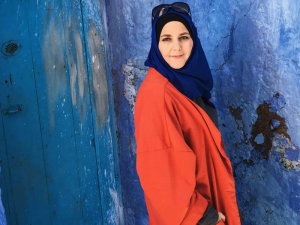 Amanda Ponzio-Mouttaki, Marocmama
Amanda Ponzio-Mouttaki, Marocmama
“In my case finding a traditional job wasn’t in the cards. Consider where you’ll be relocating and what the opportunities might be. If there are limited options for traditional employment, it’s time to start thinking creatively.
In today’s global, connected world it’s possible to have a career and build your own financial path online. Consider what your work history is, what skills you have and what possibilities exist. If you can begin trialing this before you leave your home country, you can have an understanding of what’s required. If you do decide to look for traditional employment, get connected with local expats as soon as possible. People who are on the ground already have a pulse for what’s available and where to start looking. Ideally having some sort of employment in place before you move is the best option.”
Check out our 8 strategies for landing a job overseas!
How do you plan for transportation?
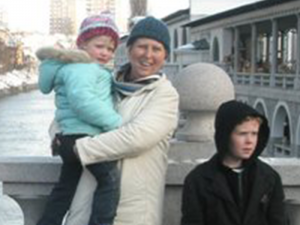 Anne-Marie Watson, Expat Aussie in NJ
Anne-Marie Watson, Expat Aussie in NJ
“You should try to work out if you are going to need a car. This means you will need to decide if you are going to commute to work or live near your workplace or, perhaps you are lucky and work from home. Even if commuting, perhaps there are public transport options like rail, bus or ferry. You may not need to buy a car if you live in an urban center like NYC or other U.S. city where it is easier to get around by non-car options.
With easy-hire car options available in the U.S. such as Zipcars, many city-based expats just rent a car for weekends if they are driving outside the city for sight-seeing or doing a trip somewhere. Other expats in the suburbs or regional areas will need to buy a car, and then they will have to think about the requirements for doing so e.g. car purchase process and costs, car insurance costs and if a local driving license is needed to legally purchase a car. Luckily in the US there are a few low paperwork programs for expats that help make car purchase easier. Getting a driving license though is often required, so that means getting the necessary paperwork, passing driving tests etc, before buying. Many expats living in the suburbs will end up renting a car until they can get a driver license and meet car purchase requirements, e.g. Social Security Number etc.”
How do you meet people abroad?
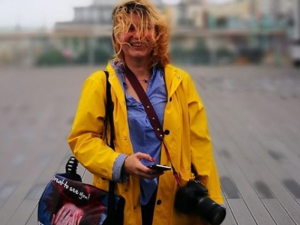 Coralie Grassin, Tea Time in Wonderland
Coralie Grassin, Tea Time in Wonderland
“I get out and explore the city as much as possible. Markets, art galleries, street food, events. There are always questions to ask and people interested in sharing their culture with you. I also select a few cafés, shops and restaurants where I become a regular. It’s such a nice feeling to be recognized and sometimes even called by your first name. Most often, this is the beginning of quite a few friendships.”
Need more tips? Check out our 8 tips for meeting fellow expats abroad.
How do you stay connected to the expat community?
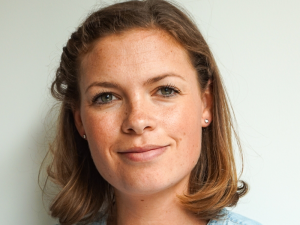 Katharina von Knobloch, Share the Love
Katharina von Knobloch, Share the Love
“Many expats are eager to meet other like-minded people; others focus on meeting locals—I am trying to do both. There is always a lot of coming and going within the expat community, so it is nice to also have some local friends. To meet people, I usually go to networking events by InterNations or look for meet-ups in town.”
How can you try and prevent culture shock?
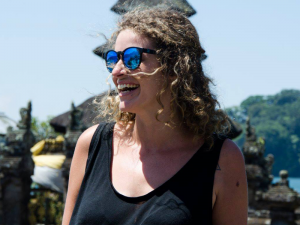 Melissa Giroux, A Broken Backpack
Melissa Giroux, A Broken Backpack
“It all depends on your destination and where you’re coming from. For me, Australia and the United Kingdom were a very easy transition as it was similar to Canada. Although, when I decided to move to Asia, I had to learn how to drive a scooter to get around and get used to the way things work. As I’ve been to Asia many times before, the transition was very smooth. If you want to prevent the cultural shock, read about the destination to prepare for it and you can also start learning the language if required.”
What have you learned about studying abroad?
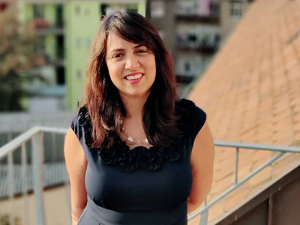 Manavi & Pragati Siddhanti, Be for Beauty
Manavi & Pragati Siddhanti, Be for Beauty
“Studying abroad is always a brave step; it involves an investment, both, in terms of time and money. However, if your intent is clear, it’s worth a shot! Here are a few pieces of what I learnt:
- A master’s of science is not the same as “continuing education”
- A resident permit (for eg. B, C and not L) reduces your tuition fee by a factor of 10
- Writing papers and carrying out research is a constant switching between full time and part time, it is possible but not practical.”
How did you learn your new native language?
 Carole Hallett Mobbs, ExpatChild
Carole Hallett Mobbs, ExpatChild
“Some people find learning a language easy, others struggle. Some prefer to learn in a formal class while others would rather work at it in private. Find out what works for you. For me, I am a visual learner, which does make language learning quite tricky. However, if I can see a word written down, I can generally work out what it means. Unsurprisingly, this didn’t work for me in Japan! But being surrounded by the new language all day – full immersion – is the quickest and most effective way to learn.
To start with, just focus on the basic phrases you need to get through day to day life: greetings, numbers, food and directions. Then, you can eat and get home if you get lost. I like to have a local language radio station on whenever I can. Simply absorbing the spoken word, with all the intonations and rhythms, helps set the language in your mind, almost subconsciously.
Look at online newspapers written in your chosen language. They are up-to-date and relevant, and you can use the pictures as clues to aid comprehension. Following a specific story over a few days can help build and confirm vocabulary.
TV and films help too. Most satellite TVs have some foreign language channels where you can learn while watching. Alternatively, select a different language option on your favorite movie. It makes for interesting and fun viewing, and is a great tool for helping your kids learn a language!”
How do you get to know the country’s food culture?
 Helene Sula, Helene in Between
Helene Sula, Helene in Between
“Go out and try everything! One of the best parts of moving abroad is tasting the cuisine and finding the new ways that people make food. Check out the local markets in your area or see if you can take a cooking class. Make sure to try the restaurants in your neighborhood or ask your neighbors where they like to eat.”
Read through our tips for finding a good restaurant while traveling!
How do you stay close to friends and family back home?
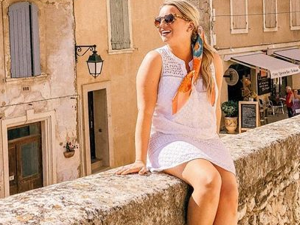 Erin Phillips, Attention to Darling
Erin Phillips, Attention to Darling
“WhatsApp is our #1 communication tool to use to keep up with family and friends. You can video and text internationally with no fees. My family also loves watching my Instagram Stories in the morning when they wake up (because we’re five hours ahead). Be sure to remind them though that just because they watch your Stories and like your posts, doesn’t mean they’re getting the full picture. You need them to call and chat – and give you an update you on life back home.”
What tips do you have for feeling at home while abroad?
 Nastasia Yakoub, Dame Traveler
Nastasia Yakoub, Dame Traveler
“Adding little touches of home, like a simple blanket, candle or a book, really make any space feel like home. Bringing sentimental items into a new space can make it feel cozy. One of my favorite days while abroad this past year was cooking in my little apartment. The ritual of doing everyday things while abroad makes everything a little closer to home. It also helps to seek out restaurants that remind you of home. When I was in Paris, there was an American diner that I used to always go to for comfort food.”
What is your favorite part of the expat experience?
 Dannielle Noonan, While I’m Young
Dannielle Noonan, While I’m Young
“Getting to experience life in another country is such an incredible opportunity. After the first six months or so, I had this awareness of what I was capable of. I’d overcome all of the challenges of moving to a foreign land where I didn’t know a soul and I’m proud of that. So for me, the best part of the expat experience is how much you learn about a new place, but also how much you learn about yourself.”
Becoming an expatriate comes with its challenges, but at the end of the day, experiencing all the world has to offer is worth the preparation!
Whether you are already planning to move abroad or just feeling inspired to get started, you can be in safe hands when it comes to managing your finances. From paying your bills to simply sending money to friends or family, Western Union is there for you no matter where you are in the world!
Get even more guidance on becoming an expat in our step-by-step guide to moving abroad.





